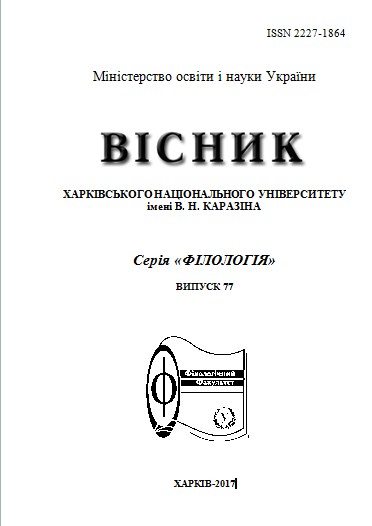Discourse of totalitarianism in the interpretation by V. Vynnychenko and G. Orwell (based on novels «It’s Your Word Now, Stalin!» and «1984»)
Abstract
The article aims to investigate the specificity of the artistic presentation of totalitarianism discourse in novels «It’s Your Word Now, Stalin!» by V. Vynnychenko and «1984» by G. Orwell through typological comparison of literary works and ideological positions of the writers. The author draws parallels between the biographical realities and their artistic interpretation in the writings by novelists. The study helps to identify and explore holistically the peculiarities of
V. Vynnychenko’s and G. Orwell’s philosophical and aesthetic approaches to the representation of such important categories in their works as state and personality, democracy and terror, personality and mass, opportunities for humanity to achieve happiness in the totalitarian world.
The theme of war and peace is a leitmotif for the creative works of both artists, in particular for novels «It’s Your Word Now, Stalin!» and «1984». However in contrast to V. Vynnychenko who showed the horror of Stalinism in the USSR focusing on the impleentation of the idea of «сollectocracy» that would eliminate all wars on the planet, G. Orwell created the image of «superstate» that embodied both features of Hitlerism and Stalinism, and author’s reflections on the evolution of totalitarianism in the world and its consequences for humanity in the future. Representing in the novels a miserable world of the totalitarian state that invalidates personalities, turning them into weak-willed mass of mediocrities, the English writer aimed to warn the world of totalitarian aggression. Instead the Ukrainian artist created the image of country of concentration camps and secret informers, proposing alternative model of the society without terror — his own idea of «сollectocracy» which implementation could not only destroy the wage labor but also prevent any conflict on the planet.
Downloads
References
2. Баран Г. П. «Сонячна машина» В. Винниченка у зіставленні з творами Є. Замятіна «Ми», О. Гакслі «Чудовий новий світ», Дж. Орвелла «1984» / Г. П. Баран // Всесв. літ. в сер. навч. закл. України. –– 1996. –– № 10. –– С. 36–39.
3. Винниченко В. Заповіт борцям за визволення / Володимир Винниченко; післям. М. Жулинського. –– К. : Вид-во «Криниця», 1991. –– 128 с.
4. Винниченко В. Оповідання. Роман «Слово за тобою, Сталіне!», п’єса «Чорна Пантера і Білий Медвідь» / Володимир Винниченко; [ред. Н. М. Максименко]. –– К. : Наук. думка, 2001. –– 438 с.
5. Винниченко В. Щоденники / Володимир Винниченко; упор. та прим. Галина Сиваченко // Київ. старовина. –– 2000. –– № 3 (333) травень –– червень. –– С. 153–167; № 4 (334) липень –– серпень. –– С. 62–83; № 5 (335) вересень –– жовтень. –– С. 50–75; № 6 (336) листопад –– грудень. –– С. 83–101.
6. Винниченко В. Щоденники / Володимир Винниченко; упор. та прим. Галина Сиваченко // Київ. старовина. –– 2001. –– № 1 (337) січень –– лютий. –– С. 91–117; № 2 (338) березень –– квітень. –– С. 63–80; № 3 (339) травень –– червень. –– С. 9–25; № 4 (340) липень –– серпень. –– С. 91–103; № 5 (341) вересень –– жовтень. –– С. 59–74; № 6 (342) листопад –– грудень. –– С. 144–153.
7. Медведев Р. Джордж Оруэлл и его книги / Рой Медведев // Библиография. –– 2004. –– № 2. –– С. 139–157.
8. Оруэлл Дж. 1984: Книга для чтения на английском языке / George Orwell; комментар. и словарь Е. Г. Тигонен. – СПб. : КАРО, 2015. –– 384 с. –– (Englishmodernprose).
9. Панченко В. Є. Будинок з химерами. Творчість Володимира Винниченка 1900 – 1920 рр. у європейському літературному контексті / Володимир Панченко. –– Кіровоград, 1998. –– 272 с.
10. Фельштинский Ю. Джордж Оруэлл (Эрик Блэр): Жизнь, труд, время / Юрий Фельштинский, Георгий Чернявский. –– М. : Книжный клуб «Книговек», 2014. –– 592 с.
11. Фромм Э. Анатомия человеческой деструктивности / Эрих Фромм; пер.; авт. вст. ст. П. С. Гуревич. –– М. : Республика, 1994. –– 447 с. –– (Мыслители ХХ века).
12. Хайек Ф. Дорога к рабству / Хайек Фридрих Август фон; пер. с англ. –– М. : Нов. издат-во, 2005. –– 264 с. (Библ-ка фонда «Либеральная миссия»).
13. Чаликова В. Неизвестый Оруэлл. Диалог / Виктория Чаликова, Вячеслав Недошивин // Иностр. лит-ра. –– 1992. –– № 2. –– С. 215––225.




